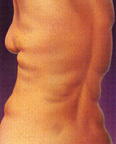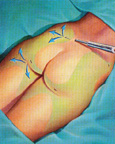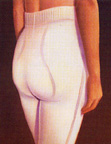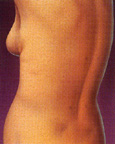We’re Stronger Together
With your help, we can make ambitious innovations in clinical care and education for our community.
| Procedure: |
Improve body shape by removing exercise-resistant fat deposits with a tube and vacuum device. Can be performed using the tumescent technique, in which targeted fat cells are infused with saline containing solution with a local anesthetic before liposuction to reduce postoperative bruising and swelling. Common locations for liposuction include chin, cheeks, neck, upper arms, above breasts, abdomen, buttocks, hips, thighs, knees, calves, ankles. For larger volumes of fat or for fibrous body areas, ultrasound-assisted lipoplasty (UAL) may be used. UAL is a new technique in which an ultrasound probe is inserted beneath the skin to "liquefy" the fat before it is suctioned. Liposuction (Suction-Assisted Lipectomy) |
| Length: | 1 to 2 hours or more. UAL: 20 - 40 percent longer than traditional liposuction. |
| Anesthesia: | Local, epidural, or general. |
| In/outpatient: | Usually outpatient. Extensive procedures may require short inpatient stay. |
| Side effects: | Temporary bruising, swelling, numbness, soreness, burning sensation. Tumescent: Temporary fluid drainage from incision sites. UAL: Larger incisions for cannula. |
| Risks: | Asymmetry; rippling or bagginess of skin; pigmentation changes; skin injury; fluid retention; excessive fluid loss leading to shock; infection. UAL: thermal burn injury caused by the heat from the ultrasound device. |
| Recovery: | Back to work: one to two weeks. More strenuous activities: two to four weeks. Full recovery from swelling and bruising: one to six months or more. Use of tumescent technique or UAL may decrease postoperative bruising and swelling. |
| Duration of results: | Permanent, with sensible diet and exercise. |




Actual patient photographs available at time of consult.
With your help, we can make ambitious innovations in clinical care and education for our community.